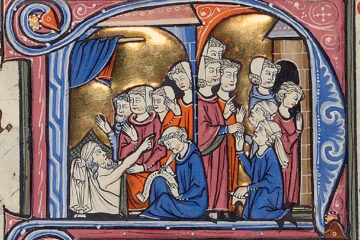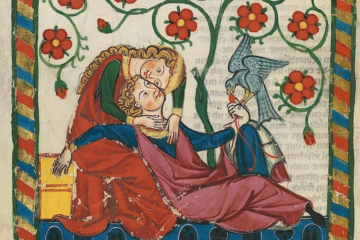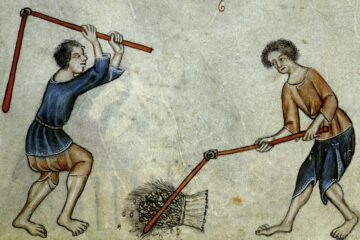by Harry Gulcher, Master of History in Rosewood
I can say I was a witness to this event, almost firsthand. Must’ve been just twelve summers old when it all started. By way of questioning the parties involved, namely the late Mayor of Forechester’s son, Lord Tancrede, some of his knights, and the Emperor’s Court Chaplain I was able to piece together a somewhat rational flow of events as to what happened and how history played out.
Around the half-point of 1087- The gray eminence behind the revolt, Augustin Armor was found by Sir Louis in the woods not too far from Rosewood or Frey. His settlement, widely known as Eden was in a state of prosperity due to it adopting a rather irregular stance towards official taxation and social hierarchy. At its beginning, the little hamlet boasted no more than 25 men and women, by the turn of the year it had amassed almost 700. Such rapid expansion can be attributed to three things:
- The unnaturally rich area surrounding it
- The societal structure of the settlement
- The fact that they paid no taxes
Augustin together with his longtime ally and rival Father Joseph, known as the “Woods’ Priest” managed to arrange society based on their beliefs that the common folk are oppressed. This viewpoint is common among rebels, but the sources and core principles of their two viewpoints differ ever so slightly.
Every man, a King – Augustin was a firm believer that every man has a right to his own destiny, that no man or force need or should lord over him. He believed in a society free from class, one made on the principle that no one would use power if none had the chance. This of course proved incorrect, which lead to his very downfall and the eventual fall of the rebellion. They knew Augustin by his banner, three golden wheat leaves on a green background. His main issue was with the nobility, monarchs in general, but he also resented the Church, even God himself as a figure of authority. His stance has been debated by theologians many a time, and always they conclude that man cannot function on a large scale without someone to rule. In Eden’s case, this form of governance where people had a shared vote (somewhat of a very extreme version of Athenian democracy) was perfect for its growth. But had Eden continued ruleless into the future with 2000 or 10.000 more citizens, it would erupt into a warzone, with the strongest vying for power and the eventual establishment of traditional rule.
God is my shepherd – Father Joseph’s views were much less radical, and even somewhat common with disgruntled clergy. His stance was that the clergy ought to assume the lead role in society, therefore he called for the overthrow of Kings and Lords, like Augustin, however, he did not advocate the same level of civic freedom. His view was that God is the only rightful King of this world and he would rule through his men and women of the cloth. Still, Joseph proved cynical of the Church and denounced it as “an inherently corrupt organization, resembling a putrid corpse in the middle of a pristine chapel”. He called for reform.
So while Augustin was vying for a Godless and Kingless rule, Father Joseph fought for the renewal of the Church and the installment of God as the one true King, the truest King.
It is known that Augustin was born in Delain, near the capital, where he was brought up by his father Johan and his mother Maria. Not much is known about his childhood except that he was rather eloquent and curious about all things.
He was arrested around the year 1086 and then released by the Bishop. He was to be exiled instead. He chose the outskirts of Rosewood as his new home.
From there he planned his rise. He associated with the downtrodden. Those who were “wronged” by the crown or church, those who found no justice in the system they currently lived in and orphaned children.
Eden became his new home and a place from which he could launch attacks. His friendship with Sir Louis managed to secure a nearby village, whose name is forgotten as it was razed to the ground following the war.
Something that was revealed only after the fact, was that the famous massacres committed by Sir Argonon, then known as “the Boy Butcher”, were treasonous crimes, and Augustin and Joseph were to be blamed, or should I say Austin and Father John, as they liked to call themselves during their moral crusades.
November 1088 – The Mayor of Forechester passes away from old age and a new Mayor is to be chosen. Through bribery and force no doubt, Augustin is elected under the guise of Lord Augustin, Alderman of the aforementioned destroyed settlement.
This was the perfect time to strike. In a year’s time, he had amassed a force of some 600 strong, most zealots who believed themselves of noble descent. Every man, a King.
The instability caused by the rebellion no doubt served as the catalyst for the Munrichian War, which started shortly after. The Emperor, now busy with taming Munrich, resorted to appointing his regent, Duke Winter as the man in charge of quelling the Folkking Rebellion. But do not err yourself, Lord Mayor Augustin was far from a King, so he is not the Folk King. In order to increase his army to a number that could rival some greater rulers even, he decided to accept an alliance with an enemy. Axel, leader of the Black Bandit Brotherhood in Delain was more than happy to take up arms with him. So much so that he and his men kidnapped a local priest and forced him to crown him as King. the coronation was of course not official, but it was enough for them. Sadly Father Jean did not survive the encounter with the bandits. And thus King Axel was born with his new nickname “the Folk King”. His army of 150 strong was added to the total, which made them extremely dangerous.
Testimony of an eye witness –
“Although he had promised us tales of honey and wine, we knew better. Any man claiming to offer nothing but wheat and song brought only blood and war with him. Truth is, the King is kind and the Emperor benevolent. We had no reason to join him. He claimed that his sons or his sons’ sons could be cruel. To that I say, let them. Their rule is part of God’s plan. We cannot interfere.“
Wilfred, son of Retherfeld.
This was the account of one Wilfred, son of Retherfeld. He was a military-aged man approached by one of Augustin’s commanders who attempted to recruit from their village. to be fair, some did join but most rejected. Here Augustin either showed true benevolence or a cunning wit. Most rulers would kill those unwilling. But Augustin spared them, either due to mercy or because he knew dissent is an infectious disease and it was easily sown through murder.
Battle of Forechester 1088 – Not much is known about the battles in the war, mainly due to a strict rule that prohibited people like me from being there to witness the happenings and aftermath of those events. Why that was, I can only assume because they wished to bury all accounts of the war. Does this put me at risk? Of course, but the Church protects my life, while I continue to serve knowledge itself.
Accounts seem to agree that the clash was between the Duke’s forces, with Duke Wilhelm, Lord Tancrede, and Sir Oswald leading the center, left and right, and Augustin’s men, with King Axel, Hugh lowborn and another peasant leading the center, left and right. The numbers were close, but in the end, the Duke’s army had myriads of experience over the rebels. It is said that Sir Oswald met with Axel in single combat and managed to best the “King” and slay him.
After seeing their figurehead die, the rebels quickly routed and their army dispersed. Augustin’s rebellion was put into question and his town besieged. The siege must have lasted at least 100 days before the defenders surrendered. Augustin Armor fled the town through a series of tunnels and his ally Father Joseph was arrested. I would have loved to have been able to question him, but he was hanged for High Treason on the 4th July 1089.
Augustin’s rebellion brought about much change in the region with like-minded individuals having to resort to secrecy and underhanded actions. Gone is the thought that all men are equal. Kings rule now. His legacy, ironically, will be the village he founded. The Mayor of Rosewood had it renamed from Eden to Kington, as a final act of mockery towards the head rebel. History will remember him as he was, a cheat, a liar, and a fanatic. May the Lord be merciful towards him in the Hell he did not believe in.


